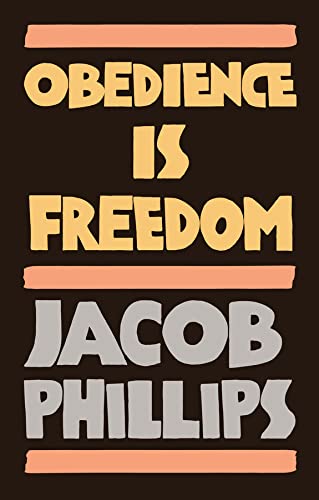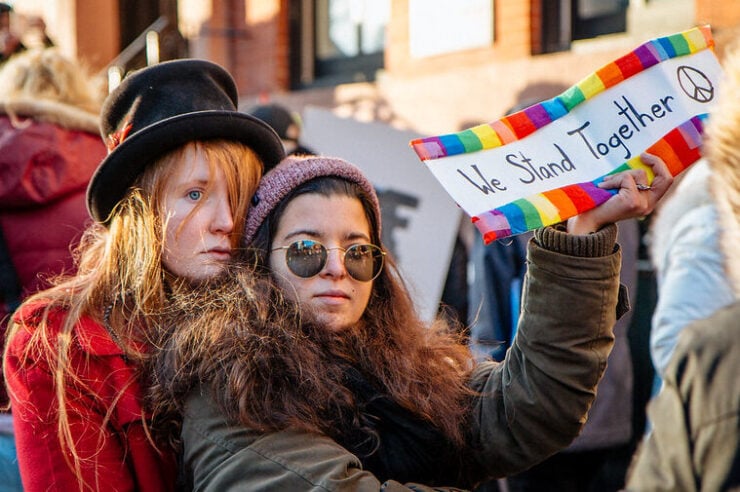
Obedience Is Freedom
by Jacob Phillips
Polity
200 pp., $19.95
Brahms had a personal motto, frei aber froh (“free but happy”), which features famously as the note sequence F-A flat-F in the first movement of his Third Symphony. He adopted this cheerful philosophy as a jovial riposte to his friend, the violinist Joseph Joachim, who had used the phrase frei aber einsam (“free but lonely”) in disconsolate self-description. Brahm’s breezy motto is still a liberal, and libertarian, ideal today.
In this pensive and highly personal study, English theologian Jacob Phillips shows that Joachim had keener insight than his famous friend; he knew that too much freedom can often mean unhappiness.
Even for those who understand this intuitively, “obedience” is a hard word, associated at least since Reformation times with coercion and mindless slavishness. Protestants will think of mumbled medieval credos, and liberals of the Italian Fascist slogan, “Believe, Obey, Fight” or the notorious Nuremberg defence, “I was only obeying orders.” The title Obedience Is Freedom could even be one of Nineteen Eighty-Four’s blatantly paradoxical Minitruth slogans. Phillips nonetheless aims to “own” this indigestible concept and give it a place of honor in the political and religious lexicons.
It is surely unnecessary to say that Phillips is not against freedom per se, but rather against the particular kinds of freedoms fetishized today. Here in the West we are largely free to buy what we want, wear what we want, sleep with whomever we want, live and travel where we want, engage in demonstrations, vote in elections, and increasingly even change our “gender”—subject only, of course, to our personal and economic resources. But there is a great deal of empirical and everyday evidence to suggest that all these liberties (which often amount to mere libertinism) are insufficient in themselves, and not obviously conducive to social stability.
For all our choice, comfort, opportunity, and stimuli, today’s West is neither dynamic nor happy; perhaps, like Prometheus, we are being tortured for knowing too much. We all know there is no such thing as a free lunch; we now need to learn there is no free freedom. For every freedom we are afforded, there are often important restrictions, paradoxical corollaries of a need to balance often competing desires—most obviously our ability to think or say what we want on an ever-expanding range of subjects. Not all colors can be found in the rainbow.
Such paradoxes have of course often been noted, but Phillips drills deeper than most. He argues that through adherence to premodern values, and by respecting established codes and rules of behavior, we can aspire to a “more enduring and genuine freedom than that offered by today’s self-fulfilment paradigm.” By sometimes reining in our own impulses, we are clearly limiting our potential “lifestyle choices.” However, self-restraint may also allow us to enter into a richer kind of existence, one that is more emotionally satisfying—just as submission to the rhyming rules of poetry has so often spurred literary genius. As Oliver Goldsmith knew, sometimes we need to “stoop to conquer.”
Allegiance, loyalty, deference, honor, respect, responsibility, discipline, and duty have all been ironized and outmoded in our civilization, which is simultaneously paedomorphic and senile. These virtues are nonetheless indispensable threads in a web of reciprocity uniting individuals who would otherwise sheer off randomly into social outer space, occasionally as brilliantly as comets, but just as aimless and lonely.
Beneath the 21st century’s “kidult” consumerism, passive-aggressive moralizing, and querulous whining, immemorial things demand attention: common cultures, shared territories and the natural world, families, friendship, love, and the religious urge. The author alternates between erudite disquisitions on ideas of freedom, borrowing from writers as different as Jonathan Haidt, Christopher Lasch, Michel Houellebecq, and Slavoj Žižek, and colorful personal anecdotage, to make a conservative case for social obligations that are cultural rather than contractual, and warmly instinctive rather than abstractly intellectual. Sometimes he strays into opacity, or overanalysis—such as in an earnest discussion of the Cockney slang term “geezer”—but behind any such curlicues can be discerned a clear sense of how societies cohere, and what people are really like.
Phillips discerns continuities where others see only divergence. The exclusively female, 1980s antinuclear demonstrators at Greenham Common, now iconized as feminist radicals, were in truth more “earth-mothers” than modern-style misandrists, whose loathing of the weapons was rooted in a maternal concern for all life. Many of the demonstrators were mothers—one of them the author’s—whereas modern feminists often seem to believe that procreation is just another oppression. “Today’s identitarian feminists would struggle particularly with Greenham’s celebration of natality, of the primordial commonality between mother and child,” Phillips writes. He believes, exaggeratedly, that many of those who were at Greenham would now be “cancelled or endlessly trolled as conservatives or reactionaries.”
The author’s mother, erstwhile Greenham idealist, developed senile dementia when Phillips was only 16 years old. He became her caretaker, indeed the only person she would speak to, until she died 19 years later. Recounting this experience leads him into a discussion of ideas of loyalty to a family, community, and place—the differences between being what the British journalist David Goodhart called the rooted “Somewhere” class and the deracinated, educated, mobile “Anywhere” elites, who predominate in global governance.
Yet Goodhart, who is commendably sympathetic to the often-disregarded Somewheres, is still a little patronizing about the importance of loyalty. Phillips, unlike Goodhart, sees loyalty as an elemental rather than a merely primitive emotion, and an uplifting one, encouraging self-sublimation in the service of others who may have few or no other defenders.
One chapter concerns Dickens, who like the Greenham women has been ideologically co-opted as a radical critic of his England and its rulers, and so by extension the modern West and capitalism. But while Dickens indeed hated injustice, Phillips insists that he “was no hater of hierarchy” nor of capitalism—just of their abuses. As George Orwell admitted of Dickens, “There is no clear sign that he wants the existing order to be overthrown or that he believes it would make much difference if it were overthrown.” For Dickens, good and evil could be found in any class, and his servant characters, like Sam Weller of The Pickwick Papers, were largely defined by their loyalty to their employers.
In contrast, modern radicals caricature the monied “ruling class” as uniquely evil (even though many come from that class themselves) and romanticize “the workers,” often without actually knowing any. Dickens, even at his most indignant, would have been immune to the impulses that compel comfortably-off 21st-century kidults to rush out into streets to shout slogans, wave fists, and topple statues in showy “solidarity” with every culture but their own. Phillips takes pains, including plundering his own “lived experience” of 1990s London clubs and ecstatic all-night raves, to unravel the modern middle-class propensities for angst, anti-traditionalism, self-censorship, globalism, nihilism, and what the 19th-century bourgeois-boosting dramatist Émile Augier called “nostalgie de la boue” (“nostalgia for mud,” Augier’s metaphor for the appeal of underclass aesthetics).
The text is crowded with well-expressed insights, many of which may seem axiomatic to Chronicles readers. Self-expression is often really just selfishness; we cannot endlessly self-create. Complete originality is impossible. Independence of action or thought often circles back into conformity, because we are limited by our own natures. Global capitalism is destabilizing and divisive, opening a crevasse between “consumers” and a tiny minority of technocratic controllers. Classlessness is a chimera, and removing old hierarchies often entails the introduction of new and worse ones. Equality depends on circumstances; all of us defer to acknowledged experts sometimes, from academics to police or plumbers. Welfare, while often essential, may also have the long-term effect of institutionalizing its recipients, or even inducing contempt.
Sensual liberty is as unsatisfying as political liberty. Pornography is existentially emptying, leaving everyone with a “permanently scorched vision” and a deeply dispiriting notion of the universe as a mechanistic eternity of grinding lumps of flesh, short-lasting sensations, and cold-eyed transactions. The sexual deviants from what norms still remain are partly the products of mainstream sexualization. Conspiracy theories, from 5G wireless mind control to the QAnon cult, may be fueled by “an intuitive sense that our cultural atmosphere is increasingly permeated with things that are unsanitary and deleterious.” By giving into our whims, by indulging our weaknesses, we risk becoming like the mutineers of the HMS Bounty, who drank saltwater and went insane, drifting in a vast and meaningless expanse.
What the West needs, Phillips concludes, is a “profound reorientation, an undoing” of Enlightenment rationalism, a rebooting so we can once again “function properly with our own solar operating system”. We need to seek “synaesthetic” rather than rationalistic connections to build a new kind of cosmology. Such would be, for many Westerners, too much to ask. Any such attempt after centuries of relativistic thinking—when even the “solar operating system” is being subjected to quantum theorizing—is, Phillips admits, literally “unthinkable.” He nevertheless dares to hope it is not unimaginable.

Leave a Reply